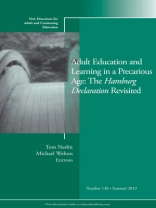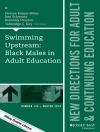UNESCO’s 1997 CONFINTEA V conference in Hamburg has beendescribed as the high-water mark of international adult educationpolicy-making. It produced one of the most utopian statements aboutadult education and learning of the past 25 years: the Hamburg Declaration on Adult Learning and Agenda for the Future.
Adult education was declared key to the twenty-first century inorder to build ‘a world in which violent conflict is replacedby dialogue, a culture of peace based on justice . . . and thecreation of a learning society committed to social justice andgeneral well-being.’ However, the Declaration also recognizedthat there were many practical challenges to its implementation asprofound changes were occurring in social, economic, environmental, and political spheres.
In this volume, North American and international scholarscritically assess how far the visionary statements of the Hamburg Declaration have been advanced and implemented. They:
* Review the recent development of the 10 themes of the Agendafor the Future
* Explore their local and global achievements through consideringthe results of the 2009 CONFINTEA VI conference and other relatedpolicy developments
* Outline what is still necessary to realize the Declaration’s goals.
This is 138th volume of this quarterly report series. Noted forits depth of coverage, it explores issues of common interest toinstructors, administrators, counselors, and policymakers in abroad range of adult and continuing education settings, such ascolleges and universities, extension programs, businesses, libraries, and museums.
Table of Content
EDITORS’ NOTES 1
Tom Nesbit, Michael Welton
1. Subjects to Citizens: Adult Learning and the Challengesof Democracy in the Twenty-First Century 9
Michael Welton
This chapter discusses the Hamburg Declaration’s concernfor promoting active citizenship and revitalizing civil societythrough an examination of the Arab Spring and Occupy movements.
2. Literacy and UNESCO: Conceptual and Historical Perspectives19
Daniel Wagner
UNESCO has long promoted literacy as a top priority. Thischapter reviews recent developments and argues that excellence willonly be assured when UNESCO encourages technical leadership andinnovation within and between nations.
3. Adult Education of Women for Social Transformation: Revivingthe Promise, Continuing the Struggle 29
Nelly P. Stromquist
This chapter compares and contrasts the conceptual and policyadvances regarding gender in the final documents emanating from thetwo most recent CONFINTEA conferences.
4. From the Quixotic to the Pragmatic: The Hamburg Declaration, Adult Education, and Work 39
Amy Rose
This chapter examines the legacy of the Hamburg Declaration inregard to work. It lays out the failure to integrate its goals intoreal work situations and analyzes some of the ways the workplacehas changed over the past fifteen years.
5. Adult Learning, Education, and the Environment 49
Darlene E. Clover, Robert Hill
This chapter considers recent developments in environmentaladult education, assesses the impact of the Hamburg Declaration, and suggests ways to move forward.
6. Adult Learning and the Promise of New Technologies 61
Dejan Dinevski, Marko Radovan
This chapter examines the challenges and possibilities ofdigital technologies in supporting and promoting access to adultlearning and fostering adults’ interactions with othercultures and society at large.
7. The Gap Between Aspiration and Practice 71
Alan Tuckett
This chapter traces the impact of international cooperation onthe policies and practices of adult learning and education, andtheir specific effecton underrepresented groups.
8. The Economics of Adult Education 81
Richard Desjardins
This chapter critically assesses the worldwide state ofinvestment in adult education by reviewing the achievements of the Hamburg Declaration in light of the recent CONFINTEA VIconference.
9. Whither Utopia? 91
Tom Nesbit
This chapter summarizes the achievements of the Hamburg Declaration and discusses the role of various institutions inshaping adult education policy and discourse. It suggests how thehope and promise of the Hamburg Declaration might be reaffi rmedand reenergized.
INDEX 101
About the author
Tom Nesbit is director of the Centre for Integrated and Credit Studies and associate dean of continuing studies at Simon Fraser University in Vancouver, British Columbia.












